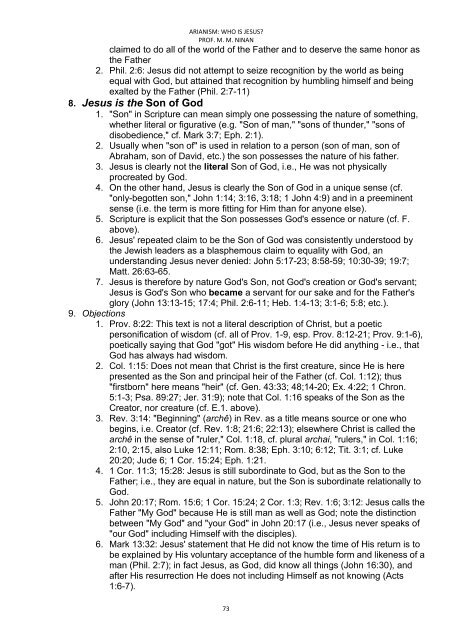Arius
You also want an ePaper? Increase the reach of your titles
YUMPU automatically turns print PDFs into web optimized ePapers that Google loves.
ARIANISM: WHO IS JESUS?<br />
PROF. M. M. NINAN<br />
claimed to do all of the world of the Father and to deserve the same honor as<br />
the Father<br />
2. Phil. 2:6: Jesus did not attempt to seize recognition by the world as being<br />
equal with God, but attained that recognition by humbling himself and being<br />
exalted by the Father (Phil. 2:7-11)<br />
8. Jesus is the Son of God<br />
1. "Son" in Scripture can mean simply one possessing the nature of something,<br />
whether literal or figurative (e.g. "Son of man," "sons of thunder," "sons of<br />
disobedience," cf. Mark 3:7; Eph. 2:1).<br />
2. Usually when "son of" is used in relation to a person (son of man, son of<br />
Abraham, son of David, etc.) the son possesses the nature of his father.<br />
3. Jesus is clearly not the literal Son of God, i.e., He was not physically<br />
procreated by God.<br />
4. On the other hand, Jesus is clearly the Son of God in a unique sense (cf.<br />
"only-begotten son," John 1:14; 3:16, 3:18; 1 John 4:9) and in a preeminent<br />
sense (i.e. the term is more fitting for Him than for anyone else).<br />
5. Scripture is explicit that the Son possesses God's essence or nature (cf. F.<br />
above).<br />
6. Jesus' repeated claim to be the Son of God was consistently understood by<br />
the Jewish leaders as a blasphemous claim to equality with God, an<br />
understanding Jesus never denied: John 5:17-23; 8:58-59; 10:30-39; 19:7;<br />
Matt. 26:63-65.<br />
7. Jesus is therefore by nature God's Son, not God's creation or God's servant;<br />
Jesus is God's Son who became a servant for our sake and for the Father's<br />
glory (John 13:13-15; 17:4; Phil. 2:6-11; Heb. 1:4-13; 3:1-6; 5:8; etc.).<br />
9. Objections<br />
1. Prov. 8:22: This text is not a literal description of Christ, but a poetic<br />
personification of wisdom (cf. all of Prov. 1-9, esp. Prov. 8:12-21; Prov. 9:1-6),<br />
poetically saying that God "got" His wisdom before He did anything - i.e., that<br />
God has always had wisdom.<br />
2. Col. 1:15: Does not mean that Christ is the first creature, since He is here<br />
presented as the Son and principal heir of the Father (cf. Col. 1:12); thus<br />
"firstborn" here means "heir" (cf. Gen. 43:33; 48;14-20; Ex. 4:22; 1 Chron.<br />
5:1-3; Psa. 89:27; Jer. 31:9); note that Col. 1:16 speaks of the Son as the<br />
Creator, nor creature (cf. E.1. above).<br />
3. Rev. 3:14: "Beginning" (archê) in Rev. as a title means source or one who<br />
begins, i.e. Creator (cf. Rev. 1:8; 21:6; 22:13); elsewhere Christ is called the<br />
archê in the sense of "ruler," Col. 1:18, cf. plural archai, "rulers," in Col. 1:16;<br />
2:10, 2:15, also Luke 12:11; Rom. 8:38; Eph. 3:10; 6:12; Tit. 3:1; cf. Luke<br />
20:20; Jude 6; 1 Cor. 15:24; Eph. 1:21.<br />
4. 1 Cor. 11:3; 15:28: Jesus is still subordinate to God, but as the Son to the<br />
Father; i.e., they are equal in nature, but the Son is subordinate relationally to<br />
God.<br />
5. John 20:17; Rom. 15:6; 1 Cor. 15:24; 2 Cor. 1:3; Rev. 1:6; 3:12: Jesus calls the<br />
Father "My God" because He is still man as well as God; note the distinction<br />
between "My God" and "your God" in John 20:17 (i.e., Jesus never speaks of<br />
"our God" including Himself with the disciples).<br />
6. Mark 13:32: Jesus' statement that He did not know the time of His return is to<br />
be explained by His voluntary acceptance of the humble form and likeness of a<br />
man (Phil. 2:7); in fact Jesus, as God, did know all things (John 16:30), and<br />
after His resurrection He does not including Himself as not knowing (Acts<br />
1:6-7).<br />
73

















